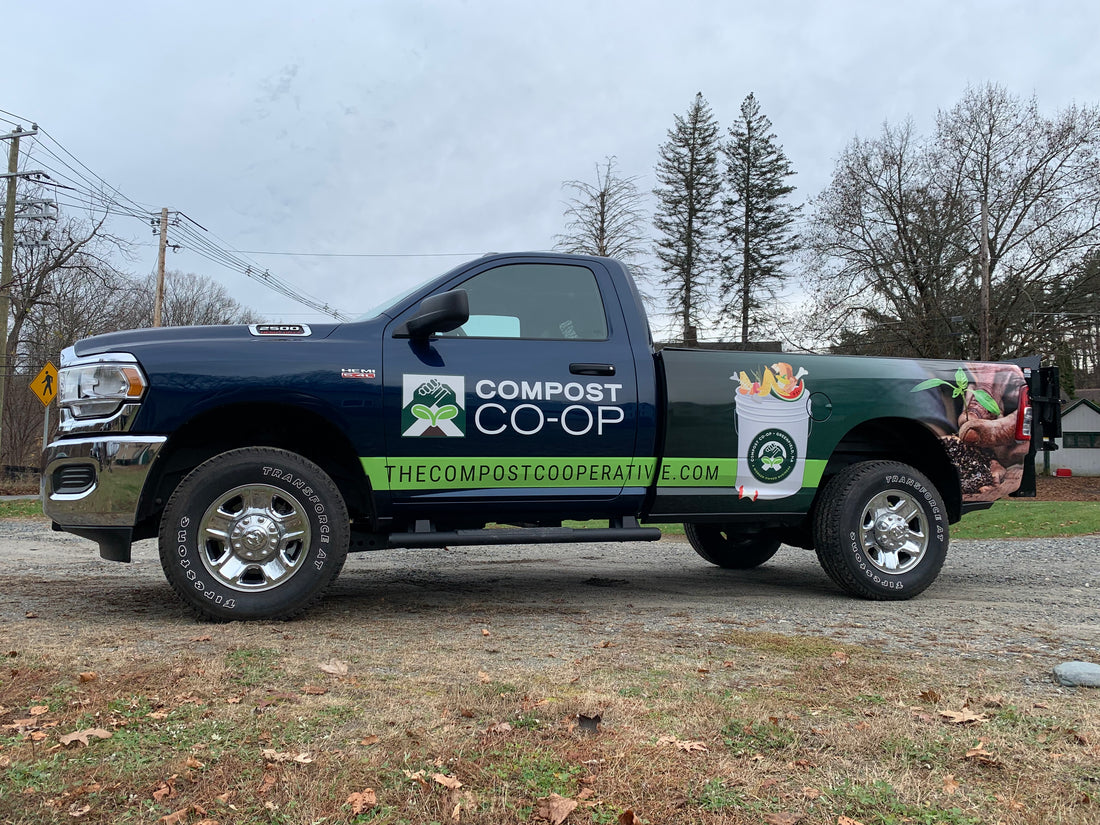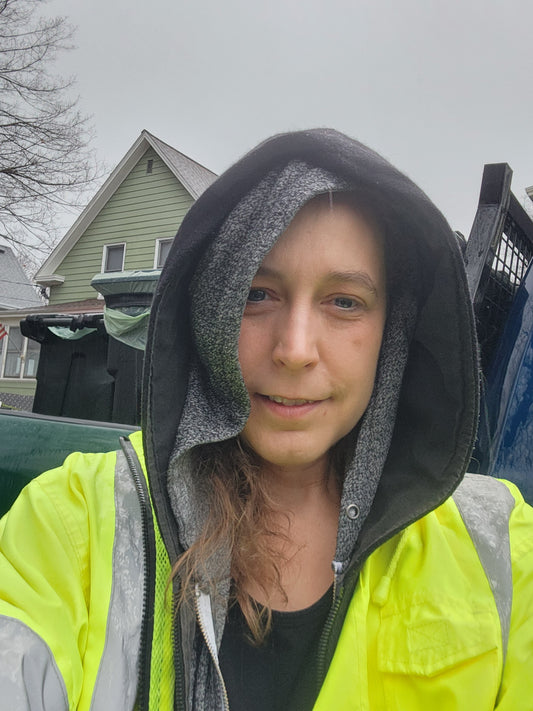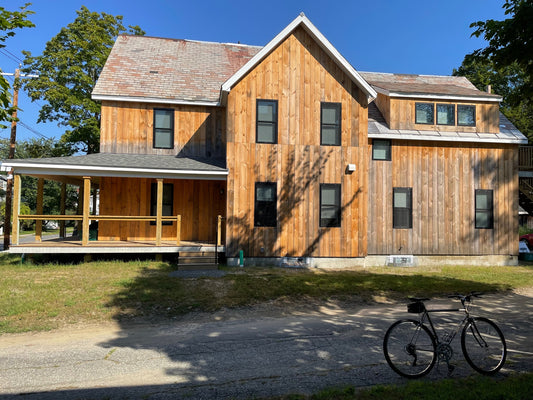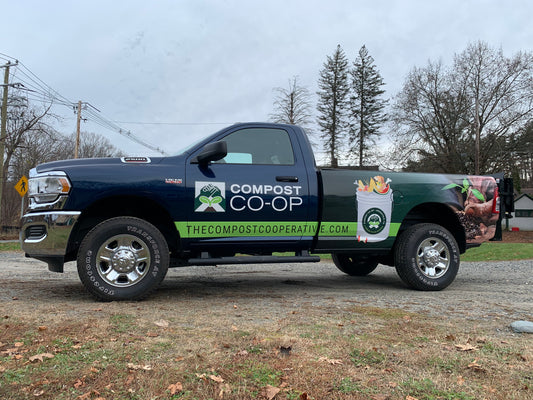Wow, 5 Years?
So many people and ideas came together with the incorporation of The Compost Co-operative in April 2018. Our fifth anniversary invites reflection about the co-op’s dreams then and how they’ve deepened as members continue building living-wage jobs, safe housing, and addressing climate change at the local level. Find out ways you can celebrate the birthday of this collective effort to compost oppressive systems. And read all the way to the end for a short history of the co-op!
5 Factoids @ 5
- Since 2018 members of the co-op have diverted almost a million pounds of compostables from the waste stream, resulting in reduced methane emission from landfills, decreased waste headed to incinerators (which contribute to high asthma rates in children), and less waste shipped from our region by rail — to South Carolina! Those scraps have been processed into roughly 186 cubic yards of compost by Martin’s Farm and Just Roots.
- The co-op serves almost 300 residential and commercial customers in Greenfield, Great Falls, Gill, Montague, Sunderland, and Deerfield.
- We also haul for the towns of Conway, Charlemont, and Shelburne, which offer residents free compostables drop-offs at their transfer stations. Please tell your friends about service in those towns! And if you have friends who live in Ashfield or Buckland, please ask them to encourage their towns to offer diversion services for their residents.
- We have talked with students at local schools and colleges about the lived experience of incarceration, co-operatives and economic democracy, and how composting can be a force for social change.
- We’re collaborating with another co-op to develop safe affordable housing for systems-impacted co-operators.

Back to Our Roots: Compost!
Customers keep asking: “When can we buy compost?”
Well, this year we have exciting plans to go back to the original idea (see below) of making compost — with a twist! We are working with an engineer at Rochester Institute of Technology to develop a system that combines Black Soldier Flies, Hermetia illucens, with the more familiar composting worms Red Wigglers, Eisenia fetida. Black soldier flies are used around the world to compost animal remains and waste, and even human waste. Red wigglers produce vermicast, beloved by farmers and gardeners. Our system is designed to be less dependent on fossil fuel than large-scale commercial composting, and will break down bones, meat, leaf matter, and compostable liners without huge shredding and sifting machines.
We hope to offer our compost for sale in 2024!
We are now raising funds to begin construction of the composting system this summer. You can help us out by letting us know:
- Do you have chickens, a lizard or other pet you would be interested in feeding black soldier fly larvae?
- Do you raise fish or have a connection to someone in the local aquaponics industry?
- Would you like to support this effort? Help us reach a matching grant of 5K in May and June: see below!

5 ways to celebrate!
- Take 5% off the price of 3 months of every-other-week service
Tell your friends, too! Now is a great time to try out curbside collection: save 5 percent off the regular price for every-other-week service of $17 every month when you sign up for 3 months! Service includes a 5-gallon bucket and a roll of compostable liners.
Please let us know if someone signs up because of your efforts, and we’ll send you a gift!
- Help us raise 5k for a matching grant to build our composting system
A generous supporter will match donations adding up to $5,000 in the months of May and June so we can construct our breeding systems. Reach out if you’re able to help: info@thecompostcooperative.com.
- Come say hi at the Greenfield Farmers’ Market: we’ll be there on opening day, April 29, as well as May 27 and June 24.
- Send 5 postcards to people you love from recycled materials
There's nothing like a hand-made postcard! Spread the compost & the love.
- Surprise us!

Where We Began
At least a dozen people were involved in the initial advocacy, visioning, and business-plan development for the Compost Co-op. Many dozens more have actively contributed to its growth in the last five years. The business grew out of years of conversation inside the Franklin County Sheriff's Office in Greenfield.
A sociology class on the history of crime and punishment in the US, based on the international Inside-Out Prison Exchange Program, which trains educators to teach college classes combining "outside" students with incarcerated "inside" students, began in 2011. Greenfield Community College Instructor Revan Schendler and former students of the class launched a "think tank" in 2012, based on similar groups started by Inside Out instructors in prisons around the country: this was the first inside a county jail. Incarcerated members shared thoughts, artwork, music, poetry, and planned public events to inspire and educate community members about incarceration. The Elm Street Think Tank sponsored annual art shows at Art Space in Greenfield, sponsored visits from musicians such as Michi Wiancko and other artists at Antenna Cloud Farm, put on writing and theater workshops, produced award-winning newspaper articles, and had ongoing discussions about punishment, transformative justice, and the human need to create.
Artists and educators who co-facilitated the Elm Street Think Tank over the years include Revan Schendler, Joan O'Beirne, Andrew Stachiw, David Abrami, Hunter Kirschner, Kent Alexander, Justin Helepololei, Eli Liebman, and Trenda Loftin. In minimum security, the think tank even went on excursions and hikes. The group met every week for ten years, even through the pandemic, before being closed down in 2022.
In 2017 think tanker Andrew Stachiw, a co-op developer and worker-owner at TESA Collective, led a Co-op Academy inside the jail; participants, including think tankers, developed the first business plan for the co-op. Andrew continues to support the co-op as a guide and technical advisor. Michael Lewis contributed to early conversations about the coop. Co-op co-founder Joshua Freund brought his knowledge of carceral systems and compost through the launching of the business and remains a close ally at the Literacy Project in Greenfield.
Flexibility and the unexpected
Inspired by worker-owned co-operative Pedal People, a human- and bicycle-powered hauling service in Northampton, the incarcerated developers of the Compost Co-op expressed a number of goals back in 2017: to give back to community, to work outside, to deal with the changing climate by diverting compostables from the waste stream and making compost, and to create living-wage jobs for people who face barriers to employment. The vision was to pick up food scraps with bicycles and turn them into compost.
Sometimes you have to adjust your vision, because it turns out there are too many hills in Greenfield and it is too far to ride to a composting facility with a trailer full of scraps. In addition, composting requires equipment, space, and permits — none of which the co-op had or could afford. So we decided to start with hauling. Matt Roncone loaned the co-op his beat-up red pickup for $10 a day and we began with two customers, People's Pint and Ice Cream Alley.
Since the co-op didn't have access to credit, the next step was to crowdfund the cost of an old truck, plus incorporation fees, vehicle and workers' compensation insurance, and a few containers: $13,000! Other early supporters include the Markham-Nathan Fund for Social Justice, Common Good, Just Roots Community Farm, the Claneil Foundation, and Amy Donovan of the Franklin County Solid Waste Management District.
In May 2018 we were on the road. Martin's Farm Compost and Mulch provided us with essential support by allowing us to tip our scraps for free until we built a customer base and revenue stream. The next year we launched residential pickups – and waited around on a certain day of the week for a food manufacturer in town to discard 5-gallon buckets, scrubbing them by hand before re-using them for customers.
It took a village, or a small city and a large group of people committed to dealing with all the unknowns of a new business venture to raise the co-op, especially through the pandemic in 2020. Hauling in all weathers is hard work, especially with old vehicles that were often in the shop. Without customers taking a leap of faith to support a local business that has had its ups and downs — without you diverting your scraps from the waste stream because, like us, you want to do something for the planet — we certainly wouldn't have made it through that uncertain time, when so many had to close their doors.
In 2020, the co-op identified workers' housing insecurity as something we had to address in order to stabilize the business. Again we crowdfunded to cover the cost of a dilapidated building, which we are redeveloping into two units of energy-efficient housing that co-op workers who face barriers to safe housing can afford. Our partner on this project is another worker-owned cooperative, Oxbow Design Build of Easthampton. MJ Adams, director of Greenfield's department of community and economic development, has been a staunch supporter of this project. James Palardy joined the co-op in 2021, bringing a breadth of knowledge of construction, mechanics, and operations to the team.
Thanks to you, our customers, supports, and friends, we're ready for the next five years.




